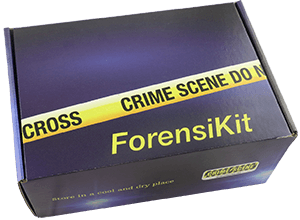
Ernie Parrish interview
Monday, June 17, 2024 – 8:00 a.m.
Ernie Parrish is the night security guard at the Oxford Eagle and was working his 11:00 p.m. to 7:00 a.m. shift on the night Monica Drum was shot.
Detectives Armstrong and Murphy interviewed him at the Yoknapatawpha County Sheriff's Department.
Participants:
- Det. T. Armstrong
- Det. S. Murphy
- Ernie Parrish
Detective Murphy: Thank you for coming in, Mr. Parrish. Would you state your name and address for the record, please?
Ernie Parrish: Ernest Parrish. 117C Skyline Drive.
Detective Armstrong: You were the security guard on duty the night Monica Drum was murdered?
Ernie Parrish: That's right. Look, it was a terrible thing, and I'm not too thrilled to be re-covering the same territory again.
Detective Murphy: Obviously, there are some specific questions we need answers to, or we wouldn't bother you, Mr. Parrish.
Ernie Parrish: I understand. No offense, but I wish y'all would just arrest whoever did this. People keep asking me morbid questions, and I've never found a polite way to tell people to mind their own damn business.
Detective Murphy: That's why we're here. Now, the night of the murder, you were making your regular rounds of the building and were in the press room when you heard shots being fired?
Ernie Parrish: That's correct. We covered this that night.
Detective Armstrong: I understand that the area to the rear of the press room is the only place employees, which includes you, are allowed to smoke. Is that correct?
Ernie Parrish: Yes, and I was back there smoking. 3:00 a.m. isn't the usual time for my rounds.
Detective Armstrong: So you were essentially goofing off when you should've been at your post?
Ernie Parrish: Look, the odds of someone actually breaking into a newspaper building are slim to none. No one in his right mind would bother because there's nothing to take besides old computers and camera gear with serial numbers and other identification, so you can't fence them. There's nothing to steal. The only reason they need a security guard is for insurance purposes.
Detective Armstrong: You were in the Marine Corps, but you didn't have the self-discipline to stay at your post when you were supposed to? That seems kind of strange, wouldn't you say?
Ernie Parrish: Whoa, wait a second! I do spend a lot of time in the smoking area and walking around the building. But that's because if I sit still for very long, the pain in my leg gets real bad. The reason I have to move around is because I got hit in the service, all right? I got an enemy marksmanship award to show for it, too.
Detective Murphy: A what?
Ernie Parrish: Purple Heart. Something they gave to guys who were living proof of the enemy's shooting skills. I've got a medal and a disability pension to show for what had to be just a lucky shot for whoever shot me. But the medal and the pension make me a lot luckier than some guys. The reason I work this job is because I can move around. I always figured the only threat to the building was a fire in the press room, so I make lots of rounds, like a fire watch, to be sure that doesn't happen. I never figured anyone would sneak in and shoot anyone.
Detective Armstrong: All right, it's obvious you weren't completely straight with us in your initial statements.
Ernie Parrish: Look, this is one of the few jobs I can still do, and I need the money to supplement my disability pension. Don't mess that up for me.
Detective Murphy: That's perfectly understandable, Mr. Parrish. We're not asking you to jeopardize your livelihood. Just be straight with us.
Ernie Parrish: All right, all right.
Detective Armstrong: When you heard the shots, did you draw your weapon?
Ernie Parrish: None of the Ace Security Guards are authorized to carry a firearm.
Detective Armstrong: But did you draw your weapon?
Ernie Parrish: Are you listening to me?
Detective Armstrong: Mr. Parrish, you have an enhanced carry permit. You must own some guns, too, right?
Ernie Parrish: I own a few firearms. So, what?
Detective Armstrong: Any handguns?
Ernie Parrish: That's none of your business.
Detective Armstrong: Do you want us to get a search warrant, or do you want to just tell us what you have?
Ernie Parrish: You don't have grounds for a warrant.
Detective Armstrong: You were the last known person to see the victim and the only one on the scene at the time of the shooting.
Ernie Parrish: Except the shooter!
Detective Armstrong: We only have your word that another person was there. I think we can get a judge to sign a warrant with what we have. Do you want us to try?
Ernie Parrish: You just want to know what handguns I've got?
Detective Armstrong: That'll do for now.
Ernie Parrish: Fine. I have a Colt 1911-A .45 caliber semi-automatic pistol, a Thompson Contender pistol, and a Glock 27 .40 caliber sub-compact semi-automatic pistol. Happy?
Detective Murphy: You're what's considered a shootist, right?
Ernie Parrish: I'm a decent shot.
Detective Armstrong: C'mon, Ernie, you've won big-time tournaments at these IHMSA events, which stands for, uh… I've got it written down here somewhere.
Ernie Parrish: International Handgun Metallic Silhouette Association.
Detective Murphy: You've hit unprecedented perfect scores shooting at stand-up metal targets that you can knock down with an open-sighted pistol at up to 200 yards, right?
Ernie Parrish: Yeah.
Detective Murphy: So you're a shootist.
Ernie Parrish: I wouldn't say that. A shootist is more like an Old West gunfighter. I don't shoot people.
Detective Armstrong: I hate to drag up the past, but you were a Marine Corps sniper during your military service, weren't you? Which means you were quite a bit deadlier than some long-dead gunfighters.
Ernie Parrish: You listen to me. I did my tours. I served my country. Despite the reputation snipers get for being assassins, the idea was to keep American soldiers from getting killed. You sound a whole lot like Monica used to, and I don't care for your tone.
Detective Murphy: So you and Monica Drum didn't get along?
Ernie Parrish: I know where this is going, and you're out of your mind. I didn't shoot Monica. Yeah, we have different opinions on a lot of things, from gun ownership to military action. Monica was as hard-headed as they come, and she tended to run off employees. Hell, I would've probably quit if she hadn't been killed, but that dog don't hunt. I haven't killed so much as an armadillo since I got a one-way ticket stateside and a permanent limp as a souvenir.
Detective Armstrong: Would you raise both pant legs for me?
Ernie Parrish: No need to be dramatic. Usually, I've got an ankle holster with my fully loaded Glock in it—but not in a police station, obviously.
Detective Armstrong: Were you wearing it when Monica Drum was shot?
Ernie Parrish: Yes.
Detective Murphy: You didn't think to mention that to anyone?
Ernie Parrish: No one asked, and I didn't think I needed to. It's small enough that with my boots on, you'd never know it was there.
Detective Murphy: If you had your weapon that night, why didn't you draw it and go after the killer?
Ernie Parrish: Because I don't have any desire to kill anyone. It's not my job anymore, and it hasn't been for a long, long time. I carry because you never know what might happen.
Detective Armstrong: But when something did happen, you didn't do anything.
Ernie Parrish: Look, I did what I was supposed to do. I called you guys. I'm not much of a runner, you know? You're right, though. I pulled the Glock as soon as I heard the shots. Thankfully, by the time I got to the front and found her, whoever shot her was gone.
Detective Murphy: Why "thankfully?"
Ernie Parrish: Because I would've shot him. I wouldn't have missed. And I want to keep the days when I put human beings in my sights in the past.
Detective Murphy: I can understand that. I hope you understand that we're going to need to get that pistol from you. We just need to run it through ballistics, and if it's not the murder weapon, we'll get it back to you.
Ernie Parrish: I'll be honest. I don't like it, but you got a job to do. I know that. I'll get it back as soon as you find out it's not the one you're looking for?
Detective Murphy: If that's what the ballistics show, then yes.
Ernie Parrish: All right. It seems like a waste of time to me, but okay. You must not have any good suspects if you're wasting time on me.
Detective Armstrong: Why do you say that?
Ernie Parrish: Well, I'm just a rent-a-cop, but it seems to me that it has to be someone with a real good motive to kill Monica, not just someone who was pissed because she fired them or made them work harder than they particularly cared for.
Detective Armstrong: Why's that?
Ernie Parrish: Those kinds of things blow over. This had to be something more than that. Besides, whoever killed Monica must've had a key to get in because I always keep the door locked. The killer didn't break in, right?
Detective Murphy: You always keep the door locked?
Ernie Parrish: Yeah, that's why I didn't worry too much about who came and went. If they're at the security desk, that means they've got a key, and they could sign themselves in as easily as I could. Otherwise, they have to knock to get inside in the first place.
Detective Armstrong: We noticed in the visitors' log that people didn't always sign out when they left. Why not?
Ernie Parrish: I don't know. Maybe they forgot. Maybe I was on one of my rounds when they left and didn't remind them. Monica and Mr. Pegues are mostly interested in which people came in and when not what time they left.
Detective Murphy: Did Monica ever ask you not to let someone specific into the building?
Ernie Parrish: Sometimes, but it was usually just whoever she was mad at that day. Or whoever was mad at her. Monica was always pissing in someone's Wheaties. I didn't pay much attention because whoever she didn't want in the building almost never came by anyway, so it didn't matter.
Detective Murphy: Who did she ban?
Ernie Parrish: I don't know. I guess Rick Hughes, mostly, whenever they had a fight. It was stupid.
Detective Murphy: Anyone else?
Ernie Parrish: Usually, when she fired someone, she'd ban them for a little while right afterwards to give them a chance to get over any hurt feelings.
Detective Armstrong: Anybody ever have a bad reaction to being banned?
Ernie Parrish: Well, nobody likes it, but everybody knows that's just how Monica is, and she'll get over it soon enough. So they can't go into the office one night. What's so bad about that?
Detective Armstrong: Is there anything else you haven't told us that you'd like to get off your chest?
Ernie Parrish: I've told you everything I know.
Detective Armstrong: We're not going to find out anything else you forgot to mention?
Ernie Parrish: No, I've been straight with you. I swear. But look, speaking of forgetting to mention things, is it possible for you to keep the fact that I carry while I'm on the job off my boss's radar? I don't want to get fired.
Detective Armstrong: It'll stay between the three of us for now. Breaking company policy isn't the same as breaking the law.
Ernie Parrish: Thanks, man. I really appreciate it.
Detective Murphy: Thank you for coming in, Mr. Parrish. We'll be in touch if we need anything else.
Interview ended – 8:32 a.m.

